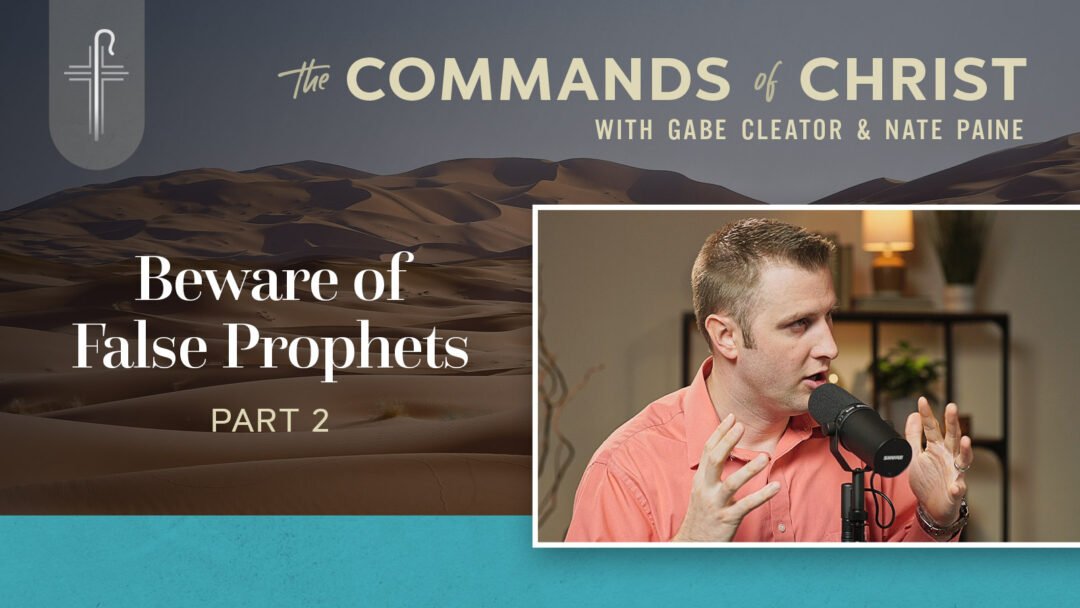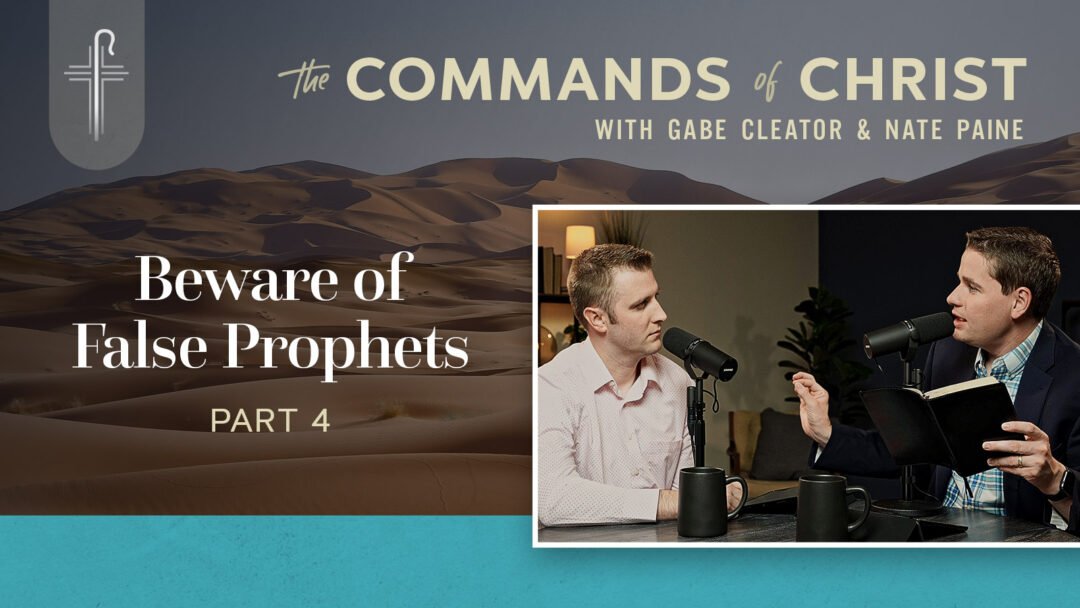
Commands of Christ
Beware of False Prophets

Where is this command found?
“Beware of false prophets, which come to you in sheep’s clothing, but inwardly they are ravening wolves. Ye shall know them by their fruits. Do men gather grapes of thorns, or figs of thistles?”
Applying This Command
The kingdom of God has a fierce opponent. It is Satan himself. He has been given limited authority by God to wage a relentless war against God and against all those who want to follow God. His chief weapon is deception, and his primary objectives are division among believers and the destruction of as many as will follow his ways.
Satan is using his power to send his ministers into the world as “angels of light.” Their function is to deceive as many as they can. “Such are false apostles, deceitful workers, transforming themselves into the apostles of Christ. And no marvel; for Satan himself is transformed into an angel of light. Therefore it is no great thing if his ministers also be transformed as the ministers of righteousness; whose end shall be according to their works” (II Corinthians 11:13–15). The responsibility of every follower of Christ is to grow to maturity so that he can recognize false prophets and false teachers and then resist deception in any form, because our “adversary the devil, as a roaring lion, walketh about, seeking whom he may devour: Whom resist stedfast in the faith, knowing that the same afflictions are accomplished in your brethren that are in the world” (I Peter 5:8–9).
According to the Old Testament, false prophets flourished during times of apostasy and impending judgment by God. The people were fearful and confused, yet they held on to the sin in their lives. God sent His prophets to warn the people to turn from their ways and live. Satan countered with his false prophets to assure them that everything was all right, that they need not fear, and that God would bless them. Today, there are also many false prophets. Some predict the end of the world or the day when Christ shall return, in spite of the Biblical truth that no one except God the Father knows the day or the hour of these events (see Mark 13:32).
In the same way that false prophets were found in the nation of Israel, as described in the Old Testament, false teachers are creeping into the Church in our day. Peter warns, “But there were false prophets also among the people, even as there shall be false teachers among you, who privily shall bring in damnable heresies, even denying the Lord that bought them, and bring upon themselves swift destruction” (II Peter 2:1). The goal of a false teacher is to gather a following of people around a false doctrine or a true doctrine taken out of balance, since truth out of balance leads to heresy. Paul warns Titus of these dangerous teachers. “For there are many unruly and vain talkers and deceivers, specially they of the circumcision: Whose mouths must be stopped, who subvert whole houses, teaching things which they ought not, for filthy lucre’s sake” (Titus 1:10–11).
A false Christ is an imposter who makes spurious claims about himself and his anointing by God. He may even be empowered by Satan to perform miracles that will deceive people into accepting him as the true Christ. He preys upon the desire of people to follow and worship a person as a god. The following warnings indicate the level of deception false Christs can perpetrate.
“For there shall arise false Christs, and false prophets, and shall shew great signs and wonders; insomuch that, if it were possible, they shall deceive the very elect” (Matthew 24:24).
“If any man shall say to you, Lo, here is Christ; or, lo, he is there; believe him not: For false Christs and false prophets shall rise, and shall shew signs and wonders, to seduce, if it were possible, even the elect” (Mark 13:21–22).
A false apostle does not have the gall to say he is Christ, but he wants the same admiration — thus, he simply claims that he is one of Christ’s chief apostles and has a special revelation from God that is obviously contrary to Christ’s teachings. “Such are false apostles, deceitful workers, transforming themselves into the apostle of Christ. And no marvel; for Satan himself is transformed into an angel of light” (II Corinthians 11:13–14).
Bible Verses for Meditation
In addition to meditation on Matthew 7:15–16, meditating on the verses below will provide you with further insight and understanding of Christ’s command: Beware of False Prophets.
II Timothy 3:13–14
“But evil men and seducers shall wax worse and worse, deceiving, and being deceived. But continue thou in the things which thou hast learned and hast been assured of, knowing of whom thou hast learned them.”
Matthew 24:24
“For there shall arise false Christs, and false prophets, and shall shew great signs and wonders; insomuch that, if it were possible, they shall deceive the very elect.”
II Corinthians 11:13–14
“For such are false apostles, deceitful workers, transforming themselves into the apostles of Christ. And no marvel; for Satan himself is transformed into an angel of light.”
Romans 16:17
“Now I beseech you, brethren, mark them which cause divisions and offences [sic] contrary to the doctrine which ye have learned; and avoid them.”
II Peter 2:19
“While they promise them liberty, they themselves are the servants of corruption: for of whom a man is overcome, of the same is he brought in bondage.”
Matthew 15:14
“Let them alone: they be blind leaders of the blind. And if the blind lead the blind, both shall fall into the ditch.”
Related Episodes
From the Podcast
Study Question
A: In Numbers 22, we read of a time when Balaam received messengers from Balak, King of Moab, who asked him to curse the nation of Israel. Balaam refused to curse Israel because God forbid him to do so. When the King sent a second group of more distinguished messengers promising rich rewards for his cooperation, Balaam again refused but invited them to spend the night while he inquired again of the Lord.
During the night, God told him, “… If the men come to call thee, rise up, and go with them; but yet the word which I shall say unto thee, that shalt thou do” (Numbers 22:20). In the morning, instead of waiting to be called as the Lord had told him, Balaam saddled his donkey and rode off with the men. The Lord’s anger was kindled against him for this disobedience.
Balaam’s disobedience was merely a symptom of his greedy heart. False prophets are said to follow the ways of Balaam when they act out of greed. “Woe unto them! for they have gone in the way of Cain, and ran greedily after the error of Balaam for reward” (Jude 11). Money is a significant motivator for those who are pretenders of the faith. In fact, a good evidence of sincerity is a spokesman for the Lord who is willing to give to the needs of others at the expense of great personal sacrifice.
The Word of God describes other characteristics of false prophets that we can learn to recognize. Identifying and rejecting false teaching is crucial, because when lies are allowed to creep into our hearts, they distort our view of God and the truth of His Word.
For Further Study
You can learn more about the command Beware of False Prophets in the book Commands of Christ: Series 3.

Other Resources


More Commands of Christ Resources
Get a FREE study guide download for this command!
You’ll receive a study guide each month as well as news and encouragement from the Home Discipleship Network.













